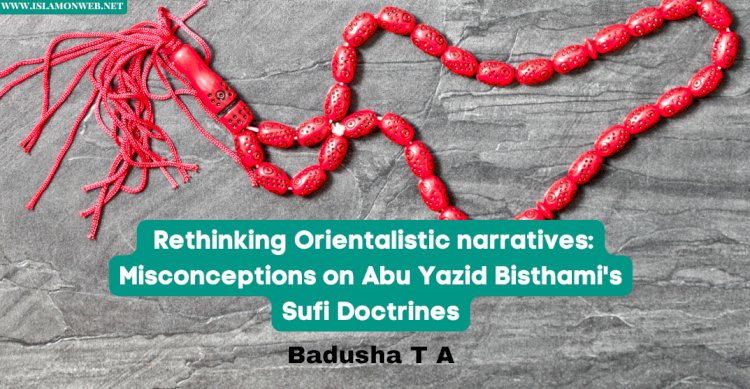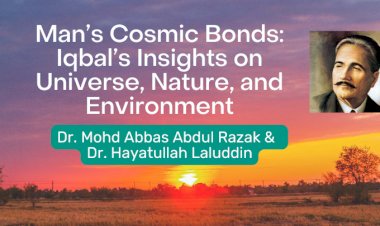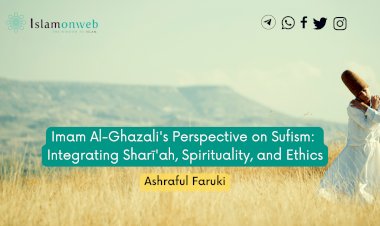Rethinking Orientalistic narratives: Misconceptions on Abu Yazid Bisthami's Sufi Doctrines
The foundation of Sufi doctrines are derived from the understanding of Islamic disciplines based on Qur'an. This principle has been elucidated by Sufi commentators in their classical accounts. But, later orientalist studies of Sufism raised a question that : Is Sufism an authentic part of Islam or is a sort of alien ideas and Practices deriving from non- Islamic sources?
In regard of Sufism, especially Persian Sufism, there has been diverse presumptions generated about the origin of mystical (Sufi) doctrines Orientalists in 19th and 20th centuries took Abu Yazid Bistami (d.874/877) as an instance for their claim. It's not incidental that they took Abu Yazid as an exemplar because he had an immense influence on the great Sufis and the title of Sulthan Al-Arifin (King of Ggnostics).
In 1907, the Orientalist Nicholson proposed that Abu Yazid was "probably" influenced by Buddhism. Afterwards, he wrote that he was certain of this influence. In 1927, Max Horton suggested that Abu Yazid was influenced by Hindhu thought. One of the most notable of the debates on this topic is the debate between A.J. Asberry and A. C. Zaehner. For Zaehner, Bisthami can be described as the borrower of Hindu mysticism into the Islamic Mysticism while Arberry described him within an Islamic framework of understanding."Islamic Mysticism in its origin and development proceeded from the Qur'an constantly recited, meditated and practised. This is where Louis Massignon's conclusions comes in. Contemporary Scholars defensed the claims of foreign roots and argued that Abu Yazid's concepts should be understood in an Islamic context rather than being interpret on the basis of external sources.
Assertion of Vedantin roots
Orientalists and Western scholars began to discuss the presumption of Hindu influence on Sufism from the very beginning. As a result, in 1821, orientalist August Tholuck declared the claim of Hindu influence in Sufism. He later abandoned this opinion for lack of evidence. Although, the question of Hindu influence in Sufism continued. The issue has been highly controversial since AC Zaehner published his work "Hindu and Muslim mysticism (1960). He wrote on Abu Yazid's involvement in bringing Vedantin ideas to Islamic mysticism. In his "Bistamiana" (1962) A J Arberry tried to disaprove Zaehner's arguments point by point.
- i) Al-Sindhi and Hindu doctrines
We can see that Abu Yazid mentions Abu Ali Al-Sindhi, a mosahib or spiritual teacher. Zaehner states that he was a (Hindu) convert to Islam and that it was from him that Abu Yazid learnt Hindu ideas. He backs up his claims with evidence in support of what Al-Sarraj (d.989) records: I used to keep company with Abu Al-Sindhi and used to show him now to perform the obligatory duties of Islam and in exchange he would give me instruction in the divine unity (tawhid) and in ultimate truths (haqā'iq).
According to Arberry, the previous text, could be interpret that Abu Yazid taught Abu Ali "he exegesis of charter I and 112 of the Qur'an" which is necessary for prayer. However, we cannot agree this because Muslim children learn these things early after they start to walk and talk. And what Mahmoud Khathami said appears to be more acceptable, he says :while discussing the relationship of Shariah and Haqaiq, Abu Yazid found that his teacher considered Shari'ah unnecessary after one reached haqiqa. Thereupon, Abu Yazid "imprinted" on Abu Ali's mind the necessity of performing obligatory duties as prescribed by Shari'ah even after the attainment of Haqiqah.
Another point of contention is the title "Sindh" which appears next to his name Max Horten and Nicholson argued that the Sindh was of Indian origin, but AJ Arberry disagreed. On the contrary, he notes that 'Sindh" could refer to a village in Khurasan named "Sindh" as recorded by the geographer Yaqut.
- ii) Abu Yazid and Upanishads
Some western scholars attempted to demonstrate Abu Yazıd's Hindu influence by pointing out similarities between his doctrines and sayings and Hindu traditional concepts and teachings.
One of the most contentious issues in this area is the debate of Anta dhaka (Thou ast that) and Tatvamasi (Thow ask that) in Chandogya Upanishad. Abu Yazid declared that during his miraj ascension, he addressed God, saying: Adorn me with your Oneness (وحدانية). Cloth me with your I-ness and raise me up to your unity (أحدية). so that when your creatures see me, they may say, "we have seen you and you shall be that, and I shall not be there".
"Thou art that" according to Zaehner, is incomprehensible in the context since the pronoun "that" (dhaka) is never used in the Arabic language to refer to God. However, the pronoun that" (tat) is frequently used in Sanskrit as a synonym for God. He further claims that the Arabic word is an exact translation of Tatvamasi (Chandogya).This argument is refuted by Arberry, who says in response to Zaehner that the pronoun "that" (thaka) is used in Qur'an to refer to God in numerous places. Concerning this, he cites Qur'an 6.95:- ذلكم الله , phrase repeated at 6:102, 10:3, 35:14.
According to Zachner, Abu Yazid's famous shatahat Subhani (Glory be to me) was borrowed from a Hindu source as well. He concludes that "subhani" is absolutely blasphemous to Muslim ears, and nothing comparable is recorded of any of the Sufis who preceed Abu Yazid and that a Sanskrit equivalent of it is found in mahyam eva namo namo" (Homage, homage to mem the Brhatsannysa Upanishad.
Mahmoud Khathami responds to this viewpoint, claiming that shatahat gushed from Abu Yazid's tongue on multiple times while he was in ecstatic feelings caused by hearing the recitation of Qur'an. Once someone recited the Qur'an veres "On that Day we shall gather the righteous to the merciful in groups.On hearing this, he said in ecstasy: "The One who Is with Him does not need to be gathered, because he is all the Hime sitting with Him".
All of this proves that his subhani, as well as other Shatahat, solely refer to Islamic contexts! Therefore, any attempts to locate a non-islamic source of Subhani" or any other of his shatahat becomes meaningless.
Claim of Buddhist Influence
R.A Nicholson proposed in 1906 that Abu Yazid was probably influenced by Buddhism.
- i) Doctrines of Fana and Nirvana"
According to Nicholson, "the method of Sufism so for as it is one of ethical self-culture, ascetic meditation and intellectual abstraction, own a great deal to Buddhism. He cites Abu Yazid's doctrine of Fana as an example, claiming that it is certain of Nirvana's Origin.
It is important to note that there are distincts between Fana and Nirvana. The consciousness of all things other than God is annihilated in Fana, including the world, the afterlife, God's gifts, even God's names and attributes. However, Nirvana cannot relate to the destruction of all awareness accept the first, the world's consciousness. Because Buddhism excludes the concept of God and thus of his reward, punishment and so on .Many muslim scholars argued that Fana, like other Sufi ideas, totally rooted on Islamic teachings, citing the following Qur'anic verse as the evidences of fana. "All thing in certain suffer annihilation and there remains the face of the Lord in its majesty and bounty" (55:26-27).
In light of this, we cannot conclude that Abu Yazid's conception of Fana was originated from the Buddhist doc trine called Nirvana.
Conclusion
To summarise, the preceding discussion shows that that Abu Yazid's thoughts should be interpret to Islamic contexts. Although, Abu Yazid's concept shares some small Similarities with Hindhu and Buddhist idealogies. When we speak logically, one cannot claim to be to describe two doctrines soley, on the basis of their similarities. It is essential to understand Abu Yazid's utterance and Sayings in the context in which they were spoken.
Bibliography
Al-Sarraj, Kitab Al-Luma Fi-al Tasawwut, Darul Kutub Al-hadeeth, 1960
Al-Sarraj, Kitab Al-Luma Fi-al Tasawwuf Translated by RA Nicholson, 1914
Arberry, AJ. "Bistamiana" Bulletin of the school of Oriental and African Studies, 1962, 28-37
Arberry, AJ. An Introduction to the History of Sufism, London: Oxford University Press, 1943
Arberry, AJ. Revelation and Reason In Islam.Vol.3, London: Routledge Library Editions Islam, 1957
Attar, Farid Al-Din. Muslim Saints And Mystics. Translated by R.A Nicholson, 2000.
Mahmoud Khathami. "Zaehner-Arberry Controversy On Abu Yazid the Sufi: Historical review". Transcendental Philosophy Journal, 7(2006): 203-225
Nicholson RA. The Mystics of Islam, world Wisdom,2002
Zaehner AC. Hindu and Muslim Mysticism, Bloomsbury Academic,2016
About the author
Badusha T A is an independent researcher in philosophy, theology and intellectual history of Islam
Disclaimer
The views expressed in this article are the author’s own and do not necessarily mirror Islamonweb’s editorial stance.
























Leave A Comment